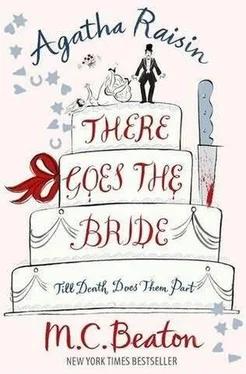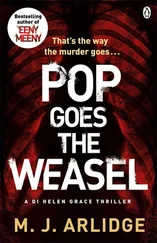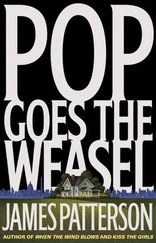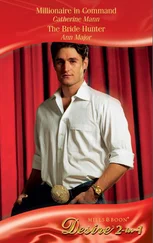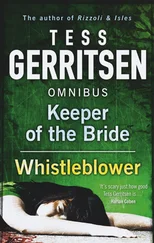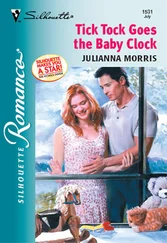Agatha hung up on him.
‘It seems that George is the one who doesn’t want us. Let’s pay our bills, Toni, and get out of here.’
Toni drove to Mircester and then Agatha said goodbye to her and drove herself home. How friendly the Cotswolds did seem after the bleakness of Downboys. It was a brisk windy day and the trees lining the steep road down to Carsely seemed to bow down in welcome as Agatha sped past.
Doris Simpson, Agatha’s cleaner, was working when Agatha let herself in. She was one of the few people in Carsely who called Agatha by her first name. ‘You look as if you could do with a nice cup of tea,’ said Doris, switching off the vacuum.
‘I could do with a stiff gin and tonic. I’ll get it. Where are my cats?’
‘They’re over at my place, playing with my cat, Scrabble. I’ll bring them over after I’ve finished here. Will you be going to the meeting in the village hall tomorrow night?’
‘Too tired. What’s it about anyway?’
‘Thinking of ways to raise money for the pub.’
‘Oh, dear. I’ve got to go. I promised Mrs Bloxby I’d do something to help and I forgot all about it.’
‘Well, just you get your drink and rest up. You really look tired.’
‘Is James home?’
‘I saw him yesterday.’
Agatha resisted an impulse to rush next door. Doris had said she looked tired. She went upstairs to the bathroom and let out a squawk of dismay. There were dark shadows under her eyes and two nasty hairs growing on her upper lip. She got rid of the hairs and then rinsed her face in cold water. After showering, she applied some skin-tightening cream before carefully making up her face and brushing her thick brown hair until it shone. She changed into a white cotton blouse and linen trousers.
Downstairs, she poured herself a stiff drink and lit a cigarette. Felicity’s murder, she reflected, would be the first case she had ever given up on. Her eyes began to close and soon she was asleep. Doris came in quietly and stubbed out Agatha’s cigarette in the ashtray.
Agatha was awakened two hours later by the sound of Doris returning with the cats. They did not seem particularly glad to see her, but then they never did after she had been away, punishing her in their cat way for what they saw as her neglect.
I’m getting old, thought Agatha, after she had paid Doris. I’m losing energy. Then she remembered she had barely slept the night before, trying to work out reasons for the two murders, and there had been the long drive home.
Feeling better, she went upstairs again and refreshed her make-up before going to call on James. He answered the door and said abruptly, ‘Come in. I’ve just been reading about this other murder in the morning papers.’
‘Let me see,’ said Agatha eagerly.
‘Sit down. I’ll get you a coffee.’
Agatha began to read the newspapers. There was very little hard information. There was no background on Sean at all, except that he earned money doing odd jobs – working on other people’s boats and occasional carpentry and gardening jobs. No mention of grieving relatives. But the press had got hold of Felicity’s previous fiancés and had also interviewed the village boys. Without actually saying so, they had portrayed Felicity as some sort of nymphomaniac. Her latest fiancé, whom she had nearly married, James Lacey, was unavailable for comment. George and Olivia must be furious, thought Agatha.
When James came back with a mug of coffee for her, Agatha said, ‘I thought the press would be at your door.’
‘They were yesterday. They’ll probably be back.’
‘Did you know Felicity was not Olivia’s daughter?’
‘No! How did you find that out?’
‘It’s odd. First Sylvan tells me Felicity was a result of an affair Olivia had and then Olivia tells me Felicity was the result of an affair George had, and before I could follow it up, the police told me Olivia wanted me to drop the case and told me to get out of town.
‘I’ll go into the office and ask Patrick to ferret around with his police contacts and see what he can dig up about Sean. Have the police been to see you?’
‘Yes, they checked up on me yesterday to make sure I hadn’t left the village.’
‘Are you going to the village hall tomorrow?’
‘Oh, about the pub? I suppose so. If we can raise enough money, it means John Fletcher can find the money to put in an outside smoking area with heaters for the cold weather. I don’t approve of smoking, but the smoking ban means the end of a lot of village pubs.’
‘How are you feeling?’ asked Agatha.
‘How do you think? Like a dirty old man.’
‘Come on. She wasn’t a teenager.’
‘I could only see the beauty,’ said James sadly and Agatha once more felt old and frumpy.
‘I’d better get to the office.’ She rose stiffly to her feet.
‘Shouldn’t you rest a bit? You look tired.’
‘That’s all I need,’ said Agatha bitterly.
On her way to the office, she was struck with an idea about how to raise interest in the pub extension. The office was empty apart from Mrs Freedman. She said that Patrick and Phil were out on jobs. ‘We really need someone else,’ she said.
‘I’ll put an ad in,’ said Agatha. ‘I’ll draft it out later.’ She picked up the phone and began to dial. She phoned every newspaper, magazine and television station she could think of, promising them that, as she was still working on the Felicity case, if they would support her in covering the meeting at the village hall, she would tip them off as soon as the case was about to break. Then she drafted out an advertisement for a detective in the local papers and gave it to Mrs Freedman to phone in.
She hoped for publican John Fletcher’s sake that the press would take the bait.
Then she left, got in her car and drove back to the Red Lion in Carsely.
‘You want me to what? asked John.
‘I want you to break down a bit, sob, sniffle, something like that. Look. If you seem sympathetic enough and it gets on local TV, you’ll get donations. Come on. A sniffle or two is worth it.’
‘I’ll feel such a fool.’
‘Do you want your damn pub or not?’ snapped Agatha.
‘Yes, but -’
‘So sniffle.’
Mrs Bloxby, who had been elected to the parish council, was on the platform with the other councillors the following evening, along with John Fletcher. Agatha hissed that she and James needed chairs on the platform as well; otherwise the press would try to interview James and the pub would be forgotten.
The village hall was packed and the press had turned out in force. Mrs Bloxby was well aware that Agatha knew how to handle this crowd better than any of them, and so the dismayed members of the parish council, who had hoped for their moment in front of the cameras, heard Mrs Bloxby announce that Mrs Raisin would explain why funds were needed.
Agatha knew the press wanted sound bites, so she started by hammering, ‘This nanny state, the worst this country has known since the days of Cromwell,’ and then went on to say that if the pub, that centre of social life in the village, closed down, then the village would lose its heart.
Even the anti-smokers in the audience were on her side because the weekly quiz game was disrupted with the smokers nipping outside for a cigarette, not to mention the darts competition and the snooker competition.
Then she called John Fletcher to the microphone. ‘Here is our landlord to say a few words. Poor John is nervous,’ said Agatha with a laugh. She produced a large handkerchief and wiped his face. The handkerchief had been soaked in onion juice from good old-fashioned garden onions. John choked and sniffled and the tears ran down his honest red face. He tried several times to speak but was overcome by the effect of the onions.
Читать дальше
